What's Cooking at Our House: Paella
Given how so many of us are over-scheduled, over-committed, over-worked and beset by a variety of anxieties, financial and otherwise, it becomes ever-more important to turn off the larger problems of the world and spend time sharing a memorable meal from start to finish.
Though I generally focus on easier-to-prepare healthy meals, memorable home-made meals add much-needed zest to life. Restaurant meals can be memorable, of course, but what's lacking is the shared process of preparing the meal--or in the case of this paella made by our French family's matriarch (83 years old), the shopping and the cooking.
My wife reports she could barely keep up with the grand dame as she traversed the 16tharrondissement, stopping at a variety of special markets for seafood, poultry and other ingredients. (We visited our French family last October, and they visited us in January. That was the motivation for the home-made pizza I recently mentioned: The New Super-Food: Pizza.)
Apartments are typically small in Paris, and so are the kitchens; this memorable meal was made in a very compact area:
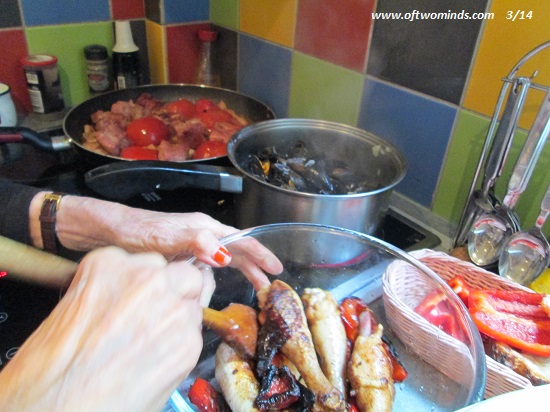
Unfortunately I don't have a written recipe for this paella, which is an old family tradition; however, you can see the ingredients on the stovetop.
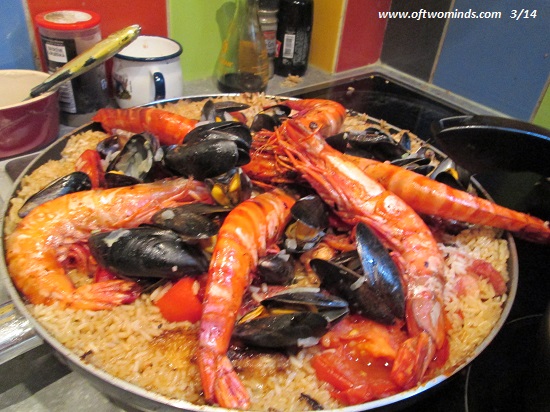
The paella being served in a classic French setting: bread and butter, a champagne aperitif (not shown), a red wine and a checkered table cloth.
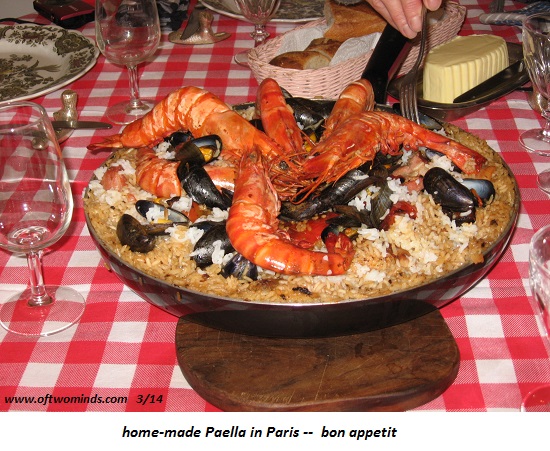
My wife snapped this photo of one set of kitchen implements, hung to save space:
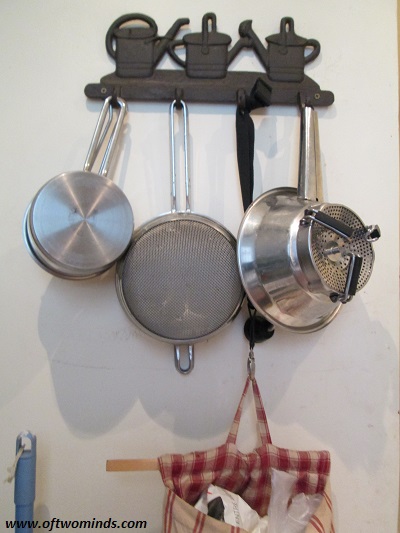
Given how so many of us are over-scheduled, over-committed, over-worked and beset by a variety of anxieties, financial and otherwise, it becomes ever-more important to turn off the larger (and ever-present) problems of the world, social media, mobile phones and every other electronic distraction and spend time sharing a memorable meal from start to finish.
Though we are trained to focus on consumption as the meaning of life--the consumption of entertainment, music, news, sports, fashion, fuel, food--that's only half of what makes something memorable: the production of the meal creates as much meaning as the consumption of the meal.
It doesn't have to be something as elaborate or costly as paella; a pot of chili works just as well. It's the sharing that matters, the reciprocity, the conviviality, all of which can only blossom with the erasure of digital distractions and a focus on the present.
In a world besotted with the artifice of consumerism, i.e. what can be bought, what matters is not what can be commodified and purchased but what can't be commodified and bought: in such a world, "A healthy homecooked family meal and a home garden are revolutionary acts."
I am occasionally accused of being an elite for eating well. This reminds me of an old Dick Gregory joke in which he described the envy of an African-American worker's Anglo-American colleagues for his new Cadillac automobile. What the co-workers didn't see, Gregory noted, was the Cadillac was the result of 5,000 brown-bag lunches. The envious never see the sacrifices of others, they only see the positive result of 5,000 daily sacrifices and wonder why they can't have the same thing.
The Nearly Free University and The Emerging Economy:
The Revolution in Higher Education
Reconnecting higher education, livelihoods and the economyWith the soaring cost of higher education, has the value a college degree been turned upside down? College tuition and fees are up 1000% since 1980. Half of all recent college graduates are jobless or underemployed, revealing a deep disconnect between higher education and the job market.
It is no surprise everyone is asking: Where is the return on investment? Is the assumption that higher education returns greater prosperity no longer true? And if this is the case, how does this impact you, your children and grandchildren?
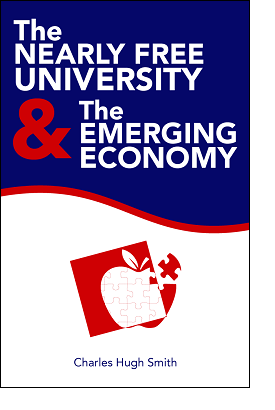
We must thoroughly understand the twin revolutions now fundamentally changing our world: The true cost of higher education and an economy that seems to re-shape itself minute to minute.
The Nearly Free University and the Emerging Economy clearly describes the underlying dynamics at work - and, more importantly, lays out a new low-cost model for higher education: how digital technology is enabling a revolution in higher education that dramatically lowers costs while expanding the opportunities for students of all ages.
The Nearly Free University and the Emerging Economy provides clarity and optimism in a period of the greatest change our educational systems and society have seen, and offers everyone the tools needed to prosper in the Emerging Economy.
Read Chapter 1/Table of Contents
print ($20) Kindle ($9.95)
Things are falling apart--that is obvious. But why are they falling apart? The reasons are complex and global. Our economy and society have structural problems that cannot be solved by adding debt to debt. We are becoming poorer, not just from financial over-reach, but from fundamental forces that are not easy to identify. We will cover the five core reasons why things are falling apart:
 1. Debt and financialization
1. Debt and financialization2. Crony capitalism
3. Diminishing returns
4. Centralization
5. Technological, financial and demographic changes in our economy
Complex systems weakened by diminishing returns collapse under their own weight and are replaced by systems that are simpler, faster and affordable. If we cling to the old ways, our system will disintegrate. If we want sustainable prosperity rather than collapse, we must embrace a new model that is Decentralized, Adaptive, Transparent and Accountable (DATA).
We are not powerless. Once we accept responsibility, we become powerful.
Read the Introduction/Table of ContentsKindle: $9.95 print: $24
| Thank you, Robert N. ($50), for your extraordinarily generous contribution to this site -- I am greatly honored by your steadfast support and readership. | Thank you, Susan H. ($50), for your stupendously generous contribution to this site -- I am greatly honored by your steadfast support and readership. |



























